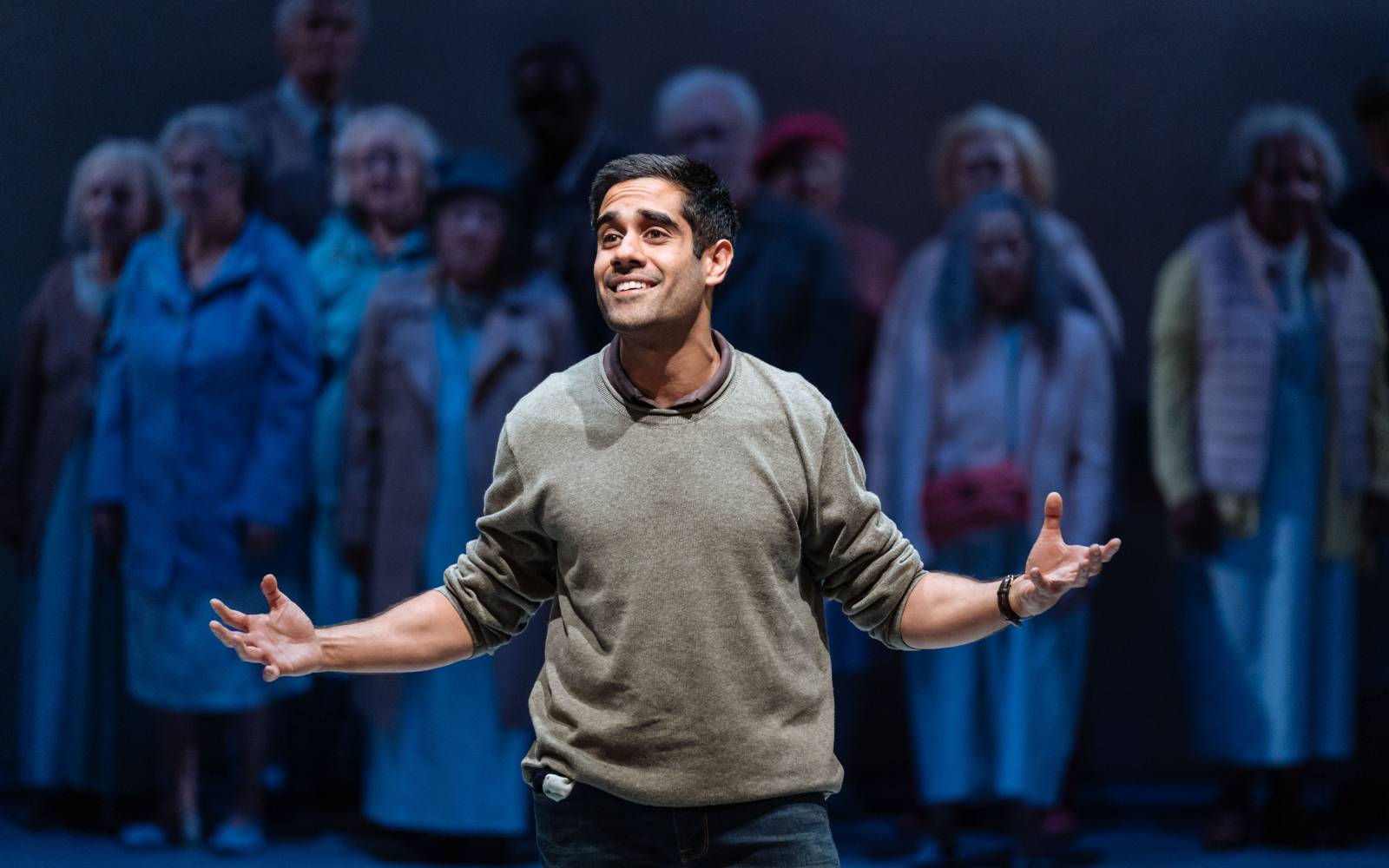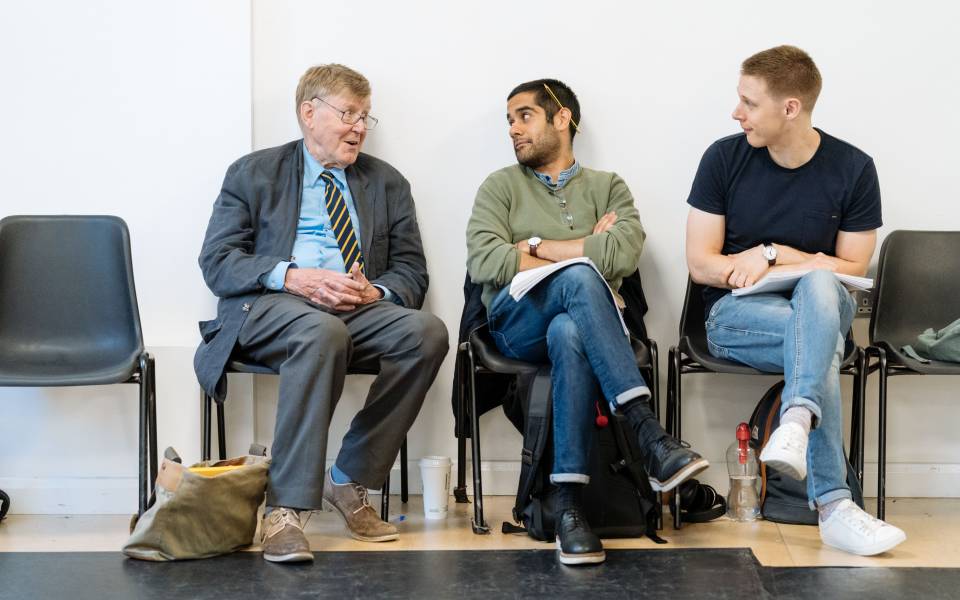
An Anglo-Saxon Chronicler
Fintan O'Toole
Samuel Beckett complained of being “damned to fame”. Alan Bennett might justifiably complain of being doomed to amiability. Indeed, in his published diaries, we hear precisely this lament: “I shall still be thought to be kindly, cosy and essentially harmless. I am in the pigeon-hole marked ‘no threat’ and did I stab Judi Dench with a pitchfork I should still be a teddy bear.” We can picture the crowd gathered around a wild-eyed Bennett, who is raving in triumph over the pitchfork-punctured body of the great actor, and sighing in pleasure: How perfectly whimsical! This is the requisite punishment for his good deeds. He is too funny, too delightfully sardonic, too compassionate, too civil and tolerant, too much inclined to favour deadpan understatement over high voltage rhetoric to be seen as one of England’s most sharply political artists.
But he is. In April 2008, when Bennett had just given his notebooks and manuscripts to the Bodleian Library at the University of Oxford, he recorded his delight at a phonecall from the keeper of special collections: “I thought you would like to know that this evening your MSS [manuscripts] are reposing in Bodley’s strongroom on the next shelf to the Anglo-Saxon Chronicle.” Bennett is an Anglo-Saxon chronicler. The greatest chroniclers record the past but also sense the future. If, instead of seeing his work as cosy and nostalgic, more attention had been paid to the terrible sense of loss that runs through it, the great crisis of Englishness that led to Brexit might not have come as such a shock. For the love affair between Bennett and England has been increasingly unrequited.
In Allelujah! Dr Valentine remarks that “rage at the death of a loved one of advanced age is happily rare”. But Bennett himself has been raging against the dying of the English light for a long time now. Nations, perhaps, are never anything but lost and Bennett is temperamentally inclined to tune in to the notes of demise in every atmosphere. His first play, Forty Years On, written when he was 34, was set in an old mansion called Albion House – the state-of-England metaphor being perhaps all too obvious. It was already valedictory, in his own words “a lament for an England that has gone”.
In his Yorkshire boyhood, as again in middle and old age, Bennett haunted mediaeval churches, drawn to their odd remnants of a vanished Catholic world, to “the dregs of history”, the accidental survivals of the Reformation and the dissolution of the monasteries. This attraction to poignant survivals is easy to dismiss as a soft wistfulness, a yearning for an imaginary past.

But Bennett is no precious antiquarian. He describes his own politics as a “blend of backward-looking radicalism and conservative socialism”. In another writer, each of these terms might seem an oxymoron, but for him they are accurate evocations of a kind of desolation. For much as he might wish otherwise, something has been lost, something spoilt, and that something is not just an old man’s youth. It is England itself.
He is, though he would not thank anyone for saying so, a national playwright. It is just that the nation he stages is not easily named. It is certainly not the United Kingdom or Britain: “Brits”, he wrote disdainfully in 2010, “– so much of what is hateful about the world since Mrs Thatcher in that gritty hard little word.” England is a closer match, and he is deeply and irredeemably English, in love with its voices, its eccentricities, its ancient churches. He is an excavator of English history. The older people whose voices he conjures so vividly are themselves survivals from their own little histories, washed up through the power of the theatre into our present-day consciousness, half wreckage and half salvage.
But this is no sentimental vision of the enduring national character. The disappearance of old things is not, for him, a mere source of regret – it is a political condition. “Loss of things”, says Valentine, “means loss of bearings. So now, unanchored, they begin to drift…” That process of the unanchoring of England has always been there to be read and enacted in Bennett’s work.
His lament for England is no mere tragedy of manners. It is a mourning for “a society systematically broken by Mrs Thatcher” and not adequately rebuilt by Tony Blair’s New Labour project. Bennett is supposed to embody a comfortable kind of Englishness but in fact he has come to represent a country that is not at all at home in its own skin, a nation retreating before the onslaught of a rapacious capitalism: “Less and less”, he has written, “are we a nation and more and more just a captive market to be exploited.”
With lesser writers, as they get older, memory becomes a retreat from the present. With Bennett, memory is a rebuke to the present. And this is a fiercely political act. The idea that there is no alternative to the market, that we must not expect to be enabled as equal citizens by the power of the state, depends on an enforced amnesia: there is no alternative because the alternatives have been forgotten. Bennett’s remembering is an act of rebellion. His is the most subversive kind of recollection, the recalling of a past in which the state created possibilities for its citizens: “whereas nowadays the state is a dirty word, for my generation the state was a saviour, delivering us out of poverty and want (and provincial boredom) and putting us on the road to a better life; the state saved my father’s life, my mother’s sanity and my own life too.” This state was a tangible, practical collective identity, an England that transcended imperial nostalgia, class prejudice and the pieties of tradition. Its slow receding has left an empty space to be filled by the confused and incoherent English nationalism whose rise was scarcely noticed until it announced itself so explosively in the Brexit vote. But like the death of the canary in the mineshaft, the demise of this deeply English writer’s love for England should have been a warning that something toxic was gathering in the air.
Yet Bennett also provides a kind of hope. Being ashamed to be English is, as he is well aware, a very English thing, a way of retaining intense feelings for the country even as he rages at it. And Bennett, even as he tries to shrug off his responsibility to do so, can’t help speaking for other ways of being English: tolerant, kind to strangers, modest, decent, funny, suspicious of all grandiosities and defiantly egalitarian. After all, as Bennett reflected in 2012, “There are different ways of being English, one of which is not to want to be English at all.” By this reckoning, of course, Dr Valentine is as English as they come – and so is Alan Bennett.
This reality is both poignant and paradoxical. Poignant because the sense of loss is all the more profound when what is lost has been so deeply loved. Bennett has paid such close attention to the state of England because his yearning for it to be in a better state is ferocious and unappeasable. Paradoxical because, as Beckett has it, “The end of life is always vivifying”. There is something thrillingly lively about the death of Bennett’s love for England. His despair is never soporific – it is a galvanising current powered by an undiminished humanity, an unfailing wit, and one of those great English consciences that cannot stop caring. His valediction is like that of a hugely welcome guest who rises to go and heads for the door but then turns and engages us again knowing that it is very late but not too late.
Fintan O’Toole, May 2018
Fintan O’Toole is a columnist with the Irish Times. He teaches in Princeton University and his most recent book is Judging Shaw.
This article was originally published in the production’s programme.
Photos by Manuel Harlan.
Further reading

Alan Bennett introduces Allelujah!
I have been writing plays (slightly to my surprise) for 50 years and more and it is a bit late in the day to confess that I tend to write a play before I do the research for it. Otherwise, knowing myself, I’m likely to get too interested not to say bogged…
More →